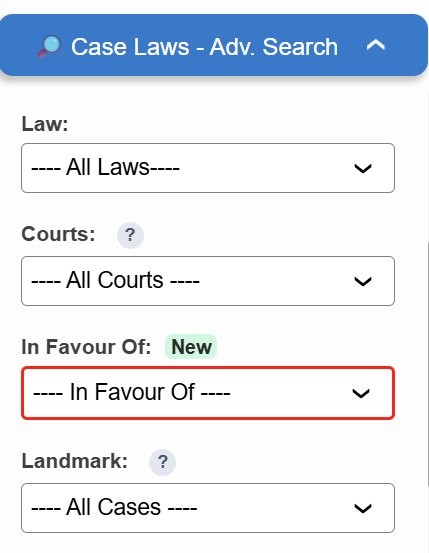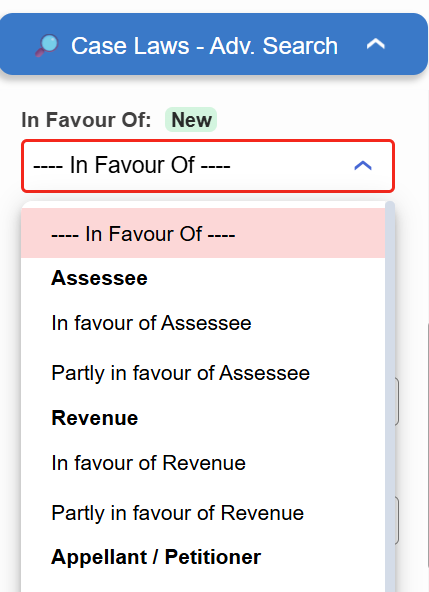Introducing the “In Favour Of” filter in Case Laws.
- ⚖️ Instantly identify judgments decided in favour of the Assessee, Revenue, or Appellant
- 🔍 Narrow down results with higher precision
Try it now in Case Laws →


Just a moment...
Introducing the “In Favour Of” filter in Case Laws.
Try it now in Case Laws →


Press 'Enter' to add multiple search terms. Rules for Better Search
No Folders have been created
Are you sure you want to delete "My most important" ?
NOTE:
Don't have an account? Register Here
<h1>High Court upholds penalty for undisclosed income, shows leniency on additional amount.</h1> The High Court upheld the penalty on the declared undisclosed income of Rs.3 lakhs due to the appellant's failure to prove its source, deeming it ... Undisclosed income - Pursuant to the notice assessee filed return in Form No.2B declaring undisclosed income of Rs.3 lakhs. However, apart from this declared undisclosed income, the assessing officer made an addition of Rs.4,15,000/-. Even though the assessee made specific plea that out of Rs.4,15,000/- Rs.3 lakhs represents gift received from Non Resident Indians, Assessee not only failed to prove it but did not even pursue the contest against assessment – Held that:- with reference to the undisclosed income of Rs.3 lakhs which though claimed as a gift, the assessee miserably failed to prove it. Penalty u/s 158BFA (2) of the I.T.Act - penalty is mandatory at least on above amount Regarding balance amount of Rs.1,15,000/- Held that:- it is only an additional amount after rejection of cash flow statement. some leniency can be shown to the assessee in respect of this amount because with the tax and penalty and the interest for delay in payment of tax the assessee would otherwise end up paying more than the undisclosed income. Issues:Levy of penalty under section 158BFA(2) of the Income Tax Act - Discretionary or mandatory nature of penalty - Failure to prove declared undisclosed income - Applicability of penalty on the entire differential amount - Interpretation of tribunal's order - Decision of Bombay High Court and Kerala High Court on penalty under section 158BFA(2).The judgment delivered by the High Court of Kerala pertained to the levy of penalty under section 158BFA(2) of the Income Tax Act. The appellant/assessee had filed a return declaring undisclosed income of Rs.3 lakhs but the assessing officer made an addition of Rs.4,15,000. The appellant failed to prove that Rs.3 lakhs represented a gift from Non-Resident Indians. The assessing officer levied a penalty on the entire differential amount, which was upheld by the Tribunal. The appellant appealed against this decision. The counsel for the assessee relied on a decision of the Bombay High Court stating that the penalty under section 158BFA(2) is discretionary, while the Standing Counsel argued that the Tribunal's decision was confirmed by the Kerala High Court in a previous case.After considering the arguments and reviewing the Tribunal's order, the High Court found no grounds to interfere with the penalty imposed on the declared undisclosed income of Rs.3 lakhs. The court noted that the appellant failed to prove the source of this amount, making the penalty mandatory under the 2nd proviso to section 158BFA(2). Therefore, the court confirmed the penalty on this amount. However, regarding the additional amount of Rs.1,15,000, the court observed that it was only an extra amount after the rejection of the cash flow statement. The court decided to show leniency to the assessee in this regard to prevent them from paying more than the undisclosed income due to taxes, penalties, and interest. As a result, the court allowed the appeal in part by excluding the penalty on Rs.1,15,000 and limiting the penalty to Rs.3 lakhs, thereby providing relief to the assessee.In conclusion, the High Court upheld the penalty on the declared undisclosed income of Rs.3 lakhs due to the appellant's failure to prove its source. However, the court showed leniency by excluding the penalty on the additional amount of Rs.1,15,000 to prevent the assessee from paying more than the undisclosed income after considering taxes, penalties, and interest.